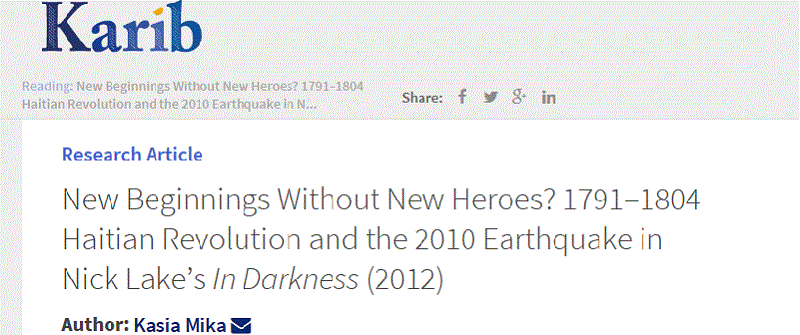
06 Nov New publication: New beginnings without new heroes? 1791–1804 Haitian revolution and the 2010 earthquake in Nick Lake’s In Darkness (2012)
‘New beginnings without new heroes? 1791–1804 Haitian revolution and the 2010 earthquake in Nick Lake’s In Darkness (2012)‘, by Kasia Mika in Karib – Nordic Journal for Caribbean Studies 4-1: 8.
This article analyses Nick Lake’s In Darkness (2012), a young adult novel which joins together, across parallel narrative threads, stories of Haiti’s 1791–1804 Revolution and its post-2010 earthquake present. I examine the novel’s use of twinning, explicitly rooted in the complex figure of divine twins in Vodou, marasa, and the parallels and tensions that this variation of a ‘multistranded narrative’ (McCullum 1999: 36) creates in the novel’s vision of Haiti’s futures. The twinning of the two narrative strands in Lake’s In Darkness works across multiple levels. First, it effectively popularises the knowledge of a key historical event, the Haitian Revolution, and Haiti’s more recent history, pointing to their contemporary relevance. Second, it presents the reader with a range of subject positions, formed around individual responses to violence, that invite nuanced conceptualisations of selfhood and intersubjectivity. Thirdly, the coming together of the two narratives in the novel’s consideration of individual and collective futures exposes the tensions within the teleological trajectory of rescue and recovery: escaping such linear designs, the collective work of recovering is an open-ended and asynchronous process. Finally, in its turn to the Revolutionary history, the novel points to the ways in which Haiti’s radical past provokes new visions of collective futures, ones that take up the task of recovering, and working towards the realization, of the guiding ideals of the Haitian Revolution.




No Comments